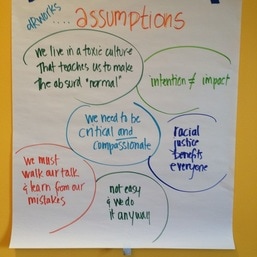A S S U M P T I O N S
These assumptions developed over time as dRworks came to better understand
both what the work was teaching us and how the work was grounding us.
both what the work was teaching us and how the work was grounding us.
At the risk of seeming ridiculous, let me We do not believe we can offer each other "safe space." Any space in which we are working together can become unsafe within moments. We do strive for "safer space" as described by Marin Burton and used here with her permission:
Safer space is a place where people can come as they are to discover, assert, and empower their voices. Safer space is a place where people can come as they are to encounter and listen deeply to the voices of others. Safer space is grounded in respect; it is a place where we assume positive intent. People within safer spaces are working toward developing trust over time and are seeking to understand first. Safer spaces require continual work and mindfulness. A seemingly safe space can turn unsafe within moments. How we handle those moments is what really determines the safety of the space. Spaces are safer when we take responsibility for what we say, feel, and think to the extent that we can and when we admit that we cannot when that is the case.
|
dRworks suggests that racial equity work is grounded in the following assumptions:
|

